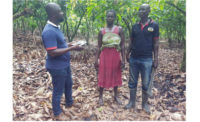Rainforest Alliance revamps certification program
Organization publishes new criteria two years after merger with UTZ.

The Rainforest Alliance has revamped its certification program, including more robust criteria, measurement and impact.
The new program will replace existing Rainforest Alliance and UTZ certification programs starting July 2021. Rainforest Alliance expects at least two million farmers around the world to use the new certification program to produce better crops, adapt to climate change, increase their productivity and reduce costs.
Major brands and businesses along the supply chain will rely on the program to source a steady supply of certified ingredients, meet their commitment to responsible business and address the rising consumer expectations for more sustainable products.
The new program consists of the Sustainable Agriculture Standard with requirements for farms and supply chains, along with a new assurance system and a suite of tools to measure progress towards sustainability objectives. The two years of work to reach this critical point build on the organization’s combined 45 years of certification experience following the merger of the Rainforest Alliance and UTZ in 2018.
The development of the new certification program included public consultations that received input from more than 1,000 people in nearly 50 countries, representing more than 200 organizations.
“The new certification program incorporates new tools to support farmers and companies to set clear sustainability targets and focus investments to improve positive impacts for people and nature,” said Ruth Rennie, director of standards and assurance at the Rainforest Alliance. “These tools and innovations will support more resilient agriculture and help make responsible business the new normal. This is increasingly urgent in our age of climate change, biodiversity loss, and global inequality.”
In May of this year, the Rainforest Alliance also released its new seal, which can be used on product packaging and promotional materials from Sept. 1, 2020. The new seal will eventually replace the current Rainforest Alliance Certified seal and the UTZ label.
Key innovations of the 2020 certification program:
• Climate-smart agriculture: A climate-smart agriculture approach is vital for farmers and businesses around the world who need to adapt to a changing climate in order to secure the future of their crops and livelihoods, products, and supply chains. The 2020 Sustainable Agriculture Standard is inherently oriented towards climate-smart agriculture with a focus on adaptation and resilience.
• Human rights: A new “Assess-and-Address” approach to tackling human rights issues such as child labor, forced labor, discrimination and workplace violence and harassment has been developed. Rather than imposing a simple ban that often drives the problem underground, the new approach focuses on assessing the risks and engaging local communities to work together to prevent and address the issues wherever and whenever they may occur.
• Improved data management: The program embraces the power of data. This means better analysis of risks and measurement of performance, new digital tools for farmers and clearer performance insights for companies. Geospatial analysis is used to support and monitor performance against key requirements of the standard such as the avoidance of deforestation.
• Shared responsibility: The program seeks to address systemic imbalances in global supply chains, which put too much burden on producers alone to achieve more sustainable agricultural production. Buyers will have to reward producers for meeting sustainable agriculture standards by paying a mandatory ‘sustainability differential’ which is an additional cash payment over and above the market price for the sale of certified crops. Buyers will also need to provide investments to support producers to achieve their sustainability objectives and be transparent about those.
• Social and environmental requirements for supply chains: Sustainable sourcing isn’t only about agricultural practices on the farm. In the new certification program, companies in the supply chain identified as having a high risk of negative social and environmental impacts will also need to implement improved practices. These include for instance ensuring decent working conditions and labor protections as well as wastewater management.
• Deforestation: Deforestation continues to be banned for certified producers, but prohibition will extend to the conversion of all natural ecosystems, including wetlands and peatlands, for more land to be protected and managed more sustainably.
• Risk-based requirements and assurance: The new certification program is based on more in-depth risk assessment of the social and environmental risks to sustainable agricultural production in different crops and countries. Data from the risk assessment will be used to provide guidance to producers and companies on where to focus their improvements for maximum impact. Similarly, incorporating risk into the assurance process can equip auditors with more effective knowledge when carrying out checks and can help them target the most urgent issues.
Looking for a reprint of this article?
From high-res PDFs to custom plaques, order your copy today!




